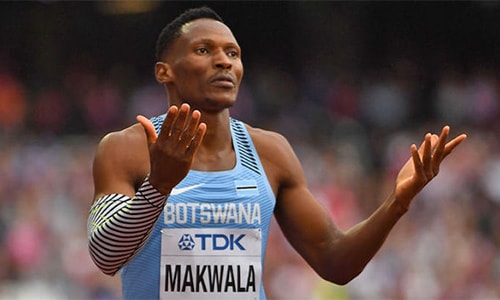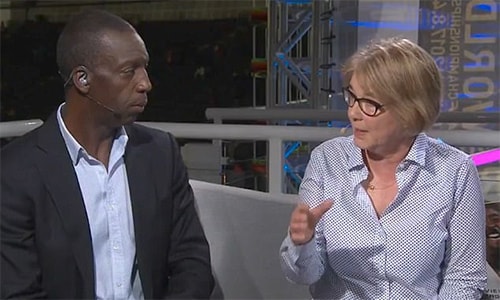Athlete misses chance to compete for world athletics gold medal due to suspected virus infection.
Makwala arrived at the 400-meter final competition venue, but was denied entry due to suspicions that he had contracted the virus.
"They said I had food poisoning. If they had clear evidence, I could accept it, but they only saw me vomiting, and saw other athletes with similar symptoms, so they jumped to the conclusion. It's unfair to me," Isaac Makwala told ITV News on the evening of August 8th.
 |
Makwala was upset at being excluded from the 400m final, despite being fit enough to compete. |
A few days earlier, the BBC reported that a number of athletes participating in the World Athletics Championships currently taking place in London had suffered from food poisoning. Doctors from the International Athletics Federation (IAAF) conducted tests on the patients and discovered the cause was norovirus – a virus that causes diarrhea, vomiting, and abdominal pain. They were forced to isolate the athletes in their hotel on Sunday (August 6th) to prevent the virus from spreading.
The IAAF confirmed that Makwala had similar symptoms on August 7th, so they isolated the Botswanan athlete in his room for 48 hours. This isolation meant that Makwala could not compete in the 400-meter final – an event in which he was considered a strong contender for the championship.
However, the problem was that the Botswana athletics team doctors insisted that Makwala was perfectly healthy and ready to compete. The athlete and her doctors arrived at the stadium just 24 hours later, hoping to still compete in the 400m final, but were not allowed in, and the IAAF did not conduct any examination.
* Makwala arrived at the stadium, but was stopped by security and not allowed in.
To provide a balanced perspective, the BBC conducted an on-location interview with Pam Venning, head of medical services at the IAAF, in the presence of three other neutral guests. The BBC stated: "Makwala shared with us that he is perfectly healthy and wants to compete from the bottom of his heart."
Explaining the whole situation, Ms. Venning said: "In fact, Makwala came to our medical center at the hotel on his own for an examination. A doctor there said that the Botswanan athlete had a stomach-related illness."
"At that time, he tried to leave, but one of our staff members held Makwala back because the gastroenteritis outbreak was spreading throughout the hotel, posing a serious threat to other athletes. Our job was to ensure their health. Meanwhile, Makwala described his symptoms as being exactly the same as those of other athletes who had contracted the disease," the head of the IAAF medical department further explained.
The Botswana team's management informed the BBC that they assured Makwala's heart rate and body temperature were normal. He only vomited once, and that was not enough to confirm that Makwala had norovirus.
 |
Pam Vennings asserted that the IAAF medical team under her command acted correctly, with the principle of ensuring the safety of other athletes during a virus outbreak. Photo: BBC. |
But Venniing claims that doctors at the IAAF had a different record of Makwala's health condition: "According to my doctors, Makwala was vomiting continuously from 10 p.m. the night before. At 2 p.m. the following day, he continued in the same condition. That's what Makwala said, and it was recorded by the doctor."
"He was staying in the same hotel as other athletes who also had similar symptoms, and those others had already been definitively diagnosed with the virus and were isolated. According to Public Health England guidelines, we didn't need to conduct further testing as those symptoms were sufficient to draw a conclusion."
However, the guest questioned whether the IAAF had acted too rigidly in Makwala's case. The IAAF's ambiguous handling of the situation led to resentment from Makwala and his fans. "Not only was he not allowed to compete, but he was also confused as to why," the guest observed.
* Without Makwala, Van Niekerk easily won the 400m final.
"We need to avoid the worst-case scenario," Venning emphasized. When asked why they didn't conduct a test to confirm whether Makwala was infected with the virus, Venning explained: "To get the most accurate results, we would have to send him to a specialized laboratory in Cambridge to collect multiple samples. The entire process would take between 36 and 48 hours."
Responding to questions about why the IAAF didn't inform Makwala of the situation, causing him to only find out he couldn't compete upon arrival at the stadium, the head of the IAAF medical department continued: "My job wasn't related to that; it was simply to protect the health of the remaining athletes. In fact, we tried to contact the athletes as early as possible, but the situation unfolded too suddenly, and we didn't have time."
Nevertheless, a large number of fans sided with Makwala in this controversy. They suspected that the IAAF doctors had exaggerated his symptoms.
Speaking to the BBC, Makwala added: "After Usain Bolt retired, the IAAF wanted to build a new icon in someone else." He was referring to Van Niekerk, who finished first in the 400-meter race with a time of 43.98 seconds. At the Diamond League in Monaco last month, Makwala achieved a time of 43.84 seconds.
* Van Niekerk beat Makwala in Monaco's Diamond League last July.
According to VNE



